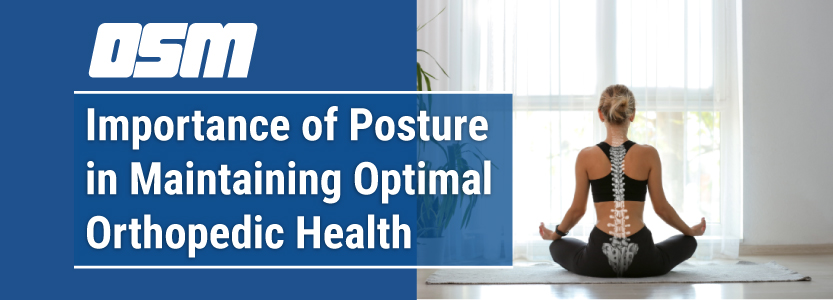Article featured on Movement Orthopedics
Healthy posture is an often overlooked but incredibly important factor in maintaining overall orthopedic health and well-being. A well-aligned spine not only enables efficient movement and body mechanics, but also reduces the risk of injuries, pain associated with strained muscles, and disorders that result from chronic misalignment. Unfortunately, everyday habits such as prolonged sitting, working at a desk, or using digital devices can contribute to poor posture, disrupting the natural balance of your spine and leading to long-term orthopedic issues.
Our team of experienced professionals is dedicated to providing comprehensive preventive care and posture correction strategies for our patients, aiming to minimize the risk of posture-related issues and improve overall quality of life. In this informative guide, we will discuss the importance of good posture, explore common causes of poor posture, and share practical tips for incorporating healthy posture habits into your daily routine.
Understanding the Foundations of Healthy Posture
Healthy posture entails maintaining a balanced and well-aligned spine that allows for efficient body movement and minimizes undue stress on muscles, joints, and ligaments. The key elements of proper posture include:
1. Head Position: Your head should be level with your shoulders, with your chin held parallel to the floor and your ears directly above your shoulders. This positioning helps to reduce strain on your neck and upper back muscles.
2. Shoulder Alignment: Shoulders should be pulled back and down, away from your ears, with your shoulder blades resting flat against your back. This posture helps to prevent rounding and tightness in the upper back and shoulders.
3. Spinal Curvature: A healthy posture maintains the three natural curves of your spine. The cervical curve in the neck, the thoracic curve in the upper back, and the lumbar curve in the lower back should all be in proper alignment to minimize strain on the spine.
4. Pelvis Position: Proper posture includes maintaining a neutral pelvis, which prevents your lower back from overarching or becoming too flattened. This alignment can help protect your lumbar spine from strain and injury.
Common Causes of Poor Posture
Various factors can contribute to poor posture, ultimately impacting your orthopedic health. Some common causes include:
1. Prolonged Sitting: Sedentary habits, such as sitting for long periods, can lead to tightened hip flexors, weakened core muscles, and a rounded upper back – all contributing to poor posture.
2. Incorrect Ergonomics: Poorly designed workstations, inadequate chairs, or incorrect computer monitor placement can strain your neck, shoulders, and back, resulting in detrimental posture habits.
3. Digital Device Use: Frequent use of smartphones, tablets, or other digital devices can lead to a forward head posture, causing undue stress on the cervical spine and leading to a condition commonly known as “tech neck.”
4. Muscle Imbalances: Weak or tight muscles in certain body regions can cause imbalances and affect your overall posture. Common culprits include weak core muscles, tight chest muscles, and weak or overstretched back muscles.
Tips for Improving and Maintaining Healthy Posture
Implementing healthy posture habits in your daily routine can have a significant impact on your orthopedic well-being. Consider the following tips to improve and maintain a proper posture:
1. Mindful Awareness: Develop a conscious awareness of your posture during daily activities such as sitting, standing, or walking. Regularly check and correct your posture to reinforce healthy habits.
2. Adjust Your Workspace: Optimize your workstation’s ergonomics with an adjustable chair, proper monitor placement, and supportive desk setup to encourage better posture during work hours.
3. Take Frequent Breaks: Periodically stand up, stretch, and move around throughout the day to prevent muscle imbalances and maintain flexibility.
4. Strengthen Your Core: Regularly engage in strengthening exercises targeting your core muscles (abdominals, lower back, and pelvic floor). A strong core can help support a healthy posture and minimize stress on your spine.
5. Stay Active: Incorporate physical activity into your routine to maintain muscle strength, flexibility, and overall functionality – all key to a well-aligned posture.
Long-Term Effects of Poor Posture on Orthopedic Health
Neglecting the importance of healthy posture can have lasting repercussions on your orthopedic health, including:
1. Chronic Pain: Poor posture can lead to chronic pain in areas such as the neck, shoulders, and back as muscles, joints, and ligaments strain to compensate for misalignment.
2. Joint Dysfunction: Altered joint mechanics resulting from faulty posture can put undue stress on the joints, potentially leading to conditions like osteoarthritis, facet joint irritation, or ligament instability.
3. Reduced Mobility: Inadequate posture can contribute to muscle imbalances, stiffness, or limited flexibility, ultimately affecting your overall range of motion and the ability to engage in daily activities.
4. Increased Risk of Injury: Poor posture can leave you more susceptible to injuries, such as muscle strains, ligament sprains, or joint dislocations, due to compromised body mechanics.
Conclusion
The importance of maintaining healthy posture in promoting orthopedic wellness cannot be overstated. By incorporating practical postural habits into your daily routine and addressing underlying causes of poor posture, you can safeguard your long-term orthopedic health and enhance your overall quality of life. Don’t let poor posture compromise your orthopedic health.




